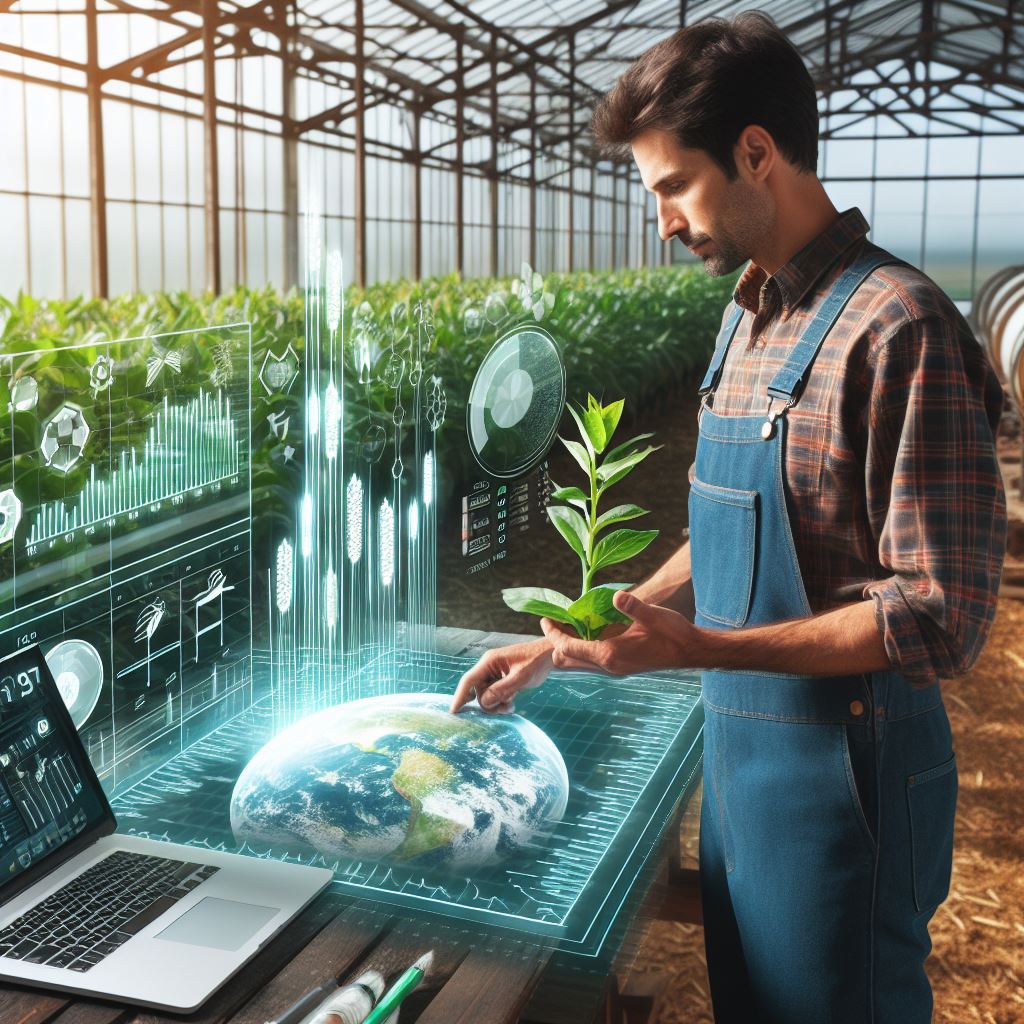Introduction
Definition of Crop Health AI
Crop Health AI, or Artificial Intelligence, is a revolutionary technology that is transforming the agricultural industry.
By using advanced algorithms and data analysis, it brings a new level of precision and efficiency to farming practices.
Crop Health AI refers to the use of machine learning and computer vision to monitor and analyze the health of crops.
It involves the collection of data from various sources, such as satellite images, drones, and sensors, to assess plant health, detect diseases, and optimize farming practices.
Why it is revolutionizing farms
The reason why Crop Health AI is revolutionizing farms is because it enables farmers to make informed decisions based on real-time and accurate information.
By identifying crop stress, diseases, or nutrient deficiencies early on, farmers can take timely actions to prevent yield loss and improve overall crop health.
Moreover, Crop Health AI helps farmers optimize the use of resources, such as water, fertilizers, and pesticides.
By precisely determining the needs of each plant or section of the field, farmers can avoid over-application of inputs, reducing costs and minimizing environmental impact.
The implementation of Crop Health AI also saves farmers time and labor.
Instead of manually inspecting each plant or field, AI algorithms can process large amounts of data quickly, providing farmers with customized recommendations and actionable insights.
Basically, Crop Health AI is revolutionizing farms by enhancing crop monitoring, optimizing resource management, and improving decision-making.
This technology has the potential to increase yield, reduce production costs, and promote sustainable farming practices, leading to a more efficient and productive agricultural sector.
Benefits of Crop Health AI
Crop Health AI, with its advanced technology and analytics, has revolutionized how farms operate and cultivators manage their crops.
This cutting-edge technology offers a wide range of benefits, positively impacting crop yields, disease prevention, water usage, fertilizer efficiency, and pesticide reduction.
Let’s explore these advantages in more detail:
Transform Your Agribusiness
Unlock your farm's potential with expert advice tailored to your needs. Get actionable steps that drive real results.
Get StartedIncreased crop yields
Crop Health AI is a game-changer when it comes to maximizing crop yields.
By leveraging machine learning algorithms and real-time data analysis, farmers can obtain valuable insights into crop health and growth patterns.
This enables them to make informed decisions regarding planting, irrigation, and pest control, leading to higher yields and improved overall productivity.
Early detection and prevention of diseases
One of the most significant advantages of Crop Health AI is its ability to detect diseases at an early stage.
By analyzing various data sources such as temperature, humidity, and soil moisture, AI algorithms can identify potential disease outbreaks before they become visible to the naked eye.
This early detection allows farmers to take timely preventive measures, such as targeted pesticide application or crop rotation, reducing the risk of widespread crop damage and losses.
Precision in water and fertilizer usage
Crop Health AI optimizes water and fertilizer usage by providing precise recommendations based on crop needs and environmental conditions.
Through sensors and data analysis, AI algorithms can assess the soil’s moisture levels, nutrient content, and overall health.
This allows farmers to determine the exact amount of water and fertilizer required for each crop, minimizing waste and increasing resource efficiency.
As a result, farmers can save on costs while minimizing the environmental impact associated with excessive water and fertilizer use.
Reduction in pesticide usage
With Crop Health AI, farmers can significantly reduce their reliance on pesticides.
By accurately analyzing crop health data and pest behavior patterns, AI algorithms can identify specific areas or crops that are more susceptible to infestations.
This targeted approach enables farmers to apply pesticides only where necessary, minimizing their usage and lowering the environmental impact.
It also reduces the risk of pesticide resistance and protects beneficial insects, preserving the natural balance within the ecosystem.
Other advantages of Crop Health AI
In addition to these primary benefits, Crop Health AI also offers other advantages such as:
- Enhanced resource management: AI algorithms can optimize the use of resources like labor, machinery, and energy, improving overall farm efficiency and reducing costs.
- Improved crop quality: By constantly monitoring crop health parameters, AI technology ensures that crops receive the optimal conditions for growth, resulting in better quality produce.
- Increased sustainability: Crop Health AI promotes sustainable agricultural practices by minimizing resource wastage, reducing chemical inputs, and preserving biodiversity.
Generally, Crop Health AI represents a significant leap forward in agricultural technology.
By harnessing the power of artificial intelligence, farmers can achieve higher crop yields, prevent diseases, optimize resource usage, and minimize pesticide reliance.
This technology not only benefits individual farmers but also contributes to the global challenge of feeding a growing population while minimizing the environmental impact of agriculture.
With continued advancements and adoption of Crop Health AI, the future of farming looks promising, efficient, and sustainable.
Read: Crop Health: Drones Leading the Way
How Crop Health AI Works
Collection of data through sensors and drones
The first step in Crop Health AI is the collection of data.
Farmers can use various sensors and drones to gather information about the health of their crops.
These devices can measure factors like temperature, humidity, soil moisture, and even crop growth rates.
By collecting such data, farmers can have a better understanding of the overall health and condition of their crops.
Showcase Your Farming Business
Publish your professional farming services profile on our blog for a one-time fee of $200 and reach a dedicated audience of farmers and agribusiness owners.
Publish Your ProfileAnalysis of data using machine learning algorithms
Once the data is collected, it is processed using machine learning algorithms.
These algorithms are designed to analyze large sets of data and identify patterns or anomalies.
In the case of Crop Health AI, the algorithms can identify patterns related to crop health and determine if there are any issues that need to be addressed.
This analysis can provide valuable insights into the current state of the crops.
Interpretation of results and recommendations
After the data is analyzed, the AI technology interprets the results and provides recommendations to the farmers.
This can involve identifying specific areas of the farm that require attention or suggesting treatments for any crop diseases or pests.
The interpretation of the results is based on the patterns and anomalies detected during the analysis process.
By providing these recommendations, Crop Health AI can assist farmers in making informed decisions to maximize crop yield and minimize losses.
Several benefits of using Crop Health AI
By using Crop Health AI, farmers can benefit in several ways.
More efficient and accurate data collection
Firstly, it allows for more efficient and accurate data collection.
Traditional methods of data collection can be time-consuming and prone to human error.
However, with the use of sensors and drones, farmers can collect data more quickly and with greater precision.
Additionally, the machine learning algorithms used in Crop Health AI can analyze the data much faster than humans, allowing for faster decision-making and action.
Help farmers optimize their farming practices
Furthermore, Crop Health AI can help farmers optimize their farming practices.
By providing recommendations based on the analyzed data, farmers can take proactive measures to prevent crop diseases or pests.
They can also adjust their irrigation or fertilization practices based on the specific needs of different areas of their farm, ultimately leading to improved crop health and higher yields.
Essentially, Crop Health AI revolutionizes farming practices by using advanced technology to collect, analyze, and interpret data related to crop health.
Through the use of sensors, drones, and machine learning algorithms, farmers can obtain valuable insights and recommendations that can enhance their decision-making and optimize their farming practices.
By embracing Crop Health AI, farmers can improve crop yields, reduce losses, and ultimately contribute to more sustainable and efficient farming.
Read: Farm Tech: AI for Sustainable Growth
Case Studies
Success stories of farms using Crop Health AI
- Green Acres Farm implemented Crop Health AI, resulting in a 20% increase in crop yield.
- Harvest Haven Farm adopted Crop Health AI, leading to a significant reduction in pesticide usage and improved crop quality.
- Sustainable Fields Farm integrated Crop Health AI into their operations, resulting in higher profits and improved sustainability.
- Productive Gardens Farm experienced a boost in crop health and productivity after implementing Crop Health AI.
- Waterwise Farms, with the help of Crop Health AI, achieved a 25% reduction in water usage and increased efficiency.
Improved crop health and productivity
Crop Health AI has shown remarkable results in enhancing crop health and improving overall productivity.
By utilizing advanced algorithms and machine learning, it assists farmers in monitoring the health of their crops.
The real-time data collected through sensors and drones enable early detection of diseases, nutrient deficiencies, and other issues affecting crop growth.
This allows farmers to take timely actions, preventing the spread of diseases and reducing crop losses.
Crop Health AI also helps optimize irrigation systems by providing precise information on soil moisture levels, thereby ensuring crops receive the right amount of water.
This targeted approach minimizes water wastage and promotes efficient resource utilization.
In addition, by analyzing environmental conditions and historical data, Crop Health AI enables farmers to make data-driven decisions regarding planting schedules, crop rotation, and pest management.
This strategic planning enhances crop health and maximizes yields.
Cost savings for farmers
Implementing Crop Health AI brings significant cost savings for farmers in various ways.
By accurately assessing crop health, farmers can apply fertilizers and pesticides only when necessary, minimizing the use of chemicals and reducing costs.
The early detection of diseases and pests allows for precise intervention, targeting affected areas rather than applying treatments over large areas.
This not only saves money but also reduces environmental impact.
Crop Health AI also assists in optimizing resource allocation, such as irrigation and labor.
By providing real-time data, farmers can avoid excessive watering, which saves water and minimizes associated costs.
It also helps in streamlining labor requirements by identifying areas that require immediate attention, ensuring efficient workforce allocation.
Furthermore, by preventing crop losses due to diseases and other threats, Crop Health AI safeguards farmers’ investments, ensuring higher profitability and financial stability.
The transformative impact of this technology
Case studies of farms utilizing Crop Health AI demonstrate the transformative impact of this technology.
Improved crop health, increased productivity, and significant cost savings make it an invaluable tool for modern agriculture.
By harnessing the power of artificial intelligence, farmers can make proactive decisions, optimize resource allocation, and ensure sustainable and profitable farm operations.
The success stories shared by these farms paint a picture of a revolutionized farming landscape, where technology combines with traditional practices to create a more efficient and environmentally friendly approach to crop cultivation.
Showcase Your Farming Business
Publish your professional farming services profile on our blog for a one-time fee of $200 and reach a dedicated audience of farmers and agribusiness owners.
Publish Your ProfileAs Crop Health AI continues to evolve and integrate with other agricultural technologies, the future of farming looks promising, with increased yields, reduced environmental impact, and improved livelihoods for farmers worldwide.
Read: Yield Prediction: AI’s New Frontier

Challenges and Limitations
In this section, we will explore the challenges and limitations faced in implementing Crop Health AI on farms.
Initial investment and infrastructure requirements
One of the main challenges is the significant initial investment required to implement Crop Health AI.
Farms need to invest in high-tech sensors, drones, and AI systems to monitor and analyze crop health accurately.
Additionally, farms may need to upgrade their existing infrastructure to support the technology.
This can include improving internet connectivity, installing power sources for the AI systems, and establishing a network for the sensors and drones to communicate.
Integration with existing farm practices
Another challenge is integrating Crop Health AI with existing farm practices seamlessly.
Farmers have established routines and practices, and introducing new technology can disrupt their workflow.
Training farmers and workers to understand and operate the AI systems efficiently is crucial.
It may require investing time and resources in educating the workforce about the benefits and implementation of the technology.
Privacy and data security concerns
Implementing Crop Health AI involves collecting and analyzing vast amounts of data related to crop health, weather conditions, and soil data.
This raises concerns about privacy and data security.
Farmers need assurance that their data will be handled securely and not misused.
Implementing robust security measures, such as encrypted data storage and secure communication protocols, is essential to address these concerns.
Limited access to technology
Not all farms have easy access to the necessary technology and support for Crop Health AI implementation.
Farms in remote areas or with limited financial resources may find it challenging to adopt this technology.
Government and industry initiatives to make the technology more accessible, such as providing subsidies or financing options, can help mitigate this limitation.
Reliance on accurate and up-to-date data
The effectiveness of Crop Health AI depends on the quality and accuracy of the data input.
The AI algorithms rely on accurate and up-to-date data to provide valuable insights and make informed decisions.
Farms need to ensure that the data collected from sensors, drones, and other sources is reliable.
Regular maintenance and calibration of the equipment and systems are necessary to maintain data accuracy.
Scalability and flexibility
Implementing Crop Health AI may be challenging for farms with varying sizes and crop types.
The technology needs to be scalable and flexible enough to accommodate different farm setups and crops.
Developing customizable AI algorithms and systems that can be tailored to specific farm requirements can help overcome this challenge.
Continuous monitoring and adaptation
Crop health is a dynamic process, and constant monitoring is required to detect potential issues and take timely action.
Crop Health AI should offer real-time monitoring capabilities to identify problems as they arise.
Farms also need to adapt and make changes based on the insights provided by the AI systems.
This may require regular updates and training to ensure effective utilization of the technology.
In general, while Crop Health AI holds great potential to revolutionize farms, it is not without its challenges and limitations.
Overcoming the initial investment and infrastructure requirements, integrating the technology with existing farm practices, addressing privacy and data security concerns, and ensuring accessibility and scalability are key to successful implementation.
With the right approach and support, Crop Health AI can significantly improve crop management and contribute to sustainable and efficient farming practices.
Read: Drones in Agri: Boosting Crop Efficiency
Future Prospects
The future prospects of Crop Health AI are promising, with advancements in technology and the potential for scalability and widespread adoption.
Advancements in technology
- Continual improvements in artificial intelligence and machine learning algorithms will enhance the capabilities of Crop Health AI.
- As technology progresses, the precision and accuracy of crop health monitoring will significantly improve.
- New sensors and imaging technologies will be developed, enabling real-time data collection and analysis.
- Integration with drones and satellite imaging will provide a comprehensive view of crop health on a larger scale.
- Advancements in data analytics will allow for better prediction and early detection of diseases and pest infestations.
Potential for scalability and widespread adoption
- With the potential to revolutionize farming practices, Crop Health AI has the ability to scale up and benefit farmers worldwide.
- The affordability and accessibility of AI technologies will drive the widespread adoption of Crop Health AI solutions.
- Large-scale implementation of Crop Health AI can lead to increased yields, reduced costs, and improved sustainability.
- AI-powered farming solutions can provide valuable insights and recommendations to farmers globally.
- As more farmers adopt Crop Health AI, the collective data can be utilized to improve algorithms and enhance predictive models.
Impacts on the agricultural industry
- Crop Health AI has the potential to address the challenges faced by the agricultural industry, such as food security and resource optimization.
- By optimizing crop management practices, AI can help reduce food waste and increase overall production efficiency.
- Early detection of crop diseases and pests can minimize losses and reduce the need for extensive use of pesticides.
- Farmers can make data-driven decisions and allocate resources effectively, leading to improved profitability and sustainability.
- The agricultural workforce can benefit from AI technologies, as manual labor can be reduced, and farmers can focus on higher-value tasks.
In essence, the future prospects of Crop Health AI in revolutionizing the agricultural industry are bright.
Advancements in technology will constantly improve the capabilities of AI systems.
The potential for scalability and widespread adoption offers tremendous benefits for farmers worldwide.
Crop Health AI has the power to address critical challenges faced by the agricultural industry and optimize resource utilization.
By embracing AI technologies, farmers can enhance their productivity, reduce costs, and contribute to a more sustainable and secure global food supply.
Gain More Insights: Gene Editing: Boosting Crop Resilience
Showcase Your Farming Business
Publish your professional farming services profile on our blog for a one-time fee of $200 and reach a dedicated audience of farmers and agribusiness owners.
Publish Your ProfileYou Might Also Like: Robotics in Organic Farming: Insights
Conclusion
Recap of the benefits and potential of Crop Health AI
Crop Health AI holds immense potential for revolutionizing farms and enhancing agricultural practices.
The benefits of this technology are numerous and cannot be ignored.
From optimizing irrigation and fertilization to detecting diseases and pests early on, Crop Health AI can significantly increase crop yields and reduce costs.
Furthermore, with the ability to analyze vast amounts of data and provide real-time insights, farmers can make more informed decisions and improve overall crop health management.
By leveraging machine learning algorithms and advanced imaging techniques, Crop Health AI offers a more efficient and accurate approach to farming.
Encouragement for farmers to explore and embrace this technology
Although embracing new technology can sometimes be daunting, it is essential for farmers to explore and embrace Crop Health AI.
By doing so, they can stay competitive in an ever-evolving agricultural landscape and ensure the sustainability of their farms.
Moreover, Crop Health AI has the potential to address critical global challenges such as food security and climate change.
With its ability to optimize resource allocation and reduce the environmental impact of farming practices, this technology can contribute to a more sustainable and resilient agricultural sector.
In a nutshell, farmers should seize the opportunity to integrate Crop Health AI into their farming operations.
It offers a transformative solution that can revolutionize the way we grow crops and tackle pressing agricultural challenges.
By embracing this technology, farmers can achieve higher yields, reduce costs, and contribute to a more sustainable future.




